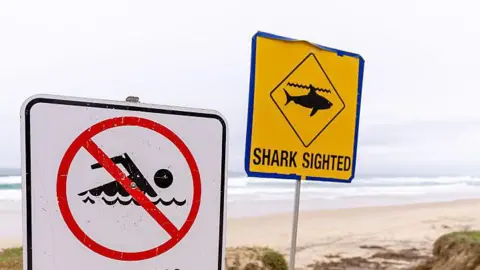Mauricio Hoyos still remembers the pressure that the jaws of a female Galapagos shark, over 3m (10ft) in length, exerted on his skull. The animal had lunged at him with astonishing speed, giving him barely enough time to duck his head in a last ditch effort to protect his jugular vein. 'When it closed its jaw, I felt the pressure of the bite, and then, after what I think was a second, it opened it again and it let me go,' Hoyos told BBC Mundo from his home in Baja California, Mexico, a little over a month after surviving the incident.
Hoyos, a marine biologist with over 30 years of experience studying sharks in their natural habitat, was on a research trip in Costa Rica when he was attacked by the shark in September. Less than two months on, and still bearing the scars from the attack on his face, he describes his recovery as 'incredible' - and says he even hopes to encounter his assailant again.
For Hoyos, what happened to him that day in the waters off Cocos Island is the result of normal animal behaviour when confronted with a perceived threat. 'In this case, this bite was like a dog's,' he says. Hoyos - who along with his colleagues attaches acoustic tags to sharks to help pinpoint their mating and spawning grounds as part of his work - was alerted to the shark's presence in the water by tourists. It was at a depth of 40m, and Hoyos told the captain of the boat he was on that he would be there 'for a maximum of five minutes'.
Hoyos remembers, 'This giant female, measuring between 3 and 3.5m (11.5ft), swam by and headed toward the bottom, and I positioned myself to tag her at the base of her dorsal fin.' But the shark reacted differently than others he had tagged throughout his career. It turned around and stared at him before lunging at him.
Hoyos managed to escape with serious injuries, but he is determined to not let this incident stop him. He plans to return to the same waters in January. 'This is the proof that this female spared my life; I can't put it any other way. And this will allow me to continue speaking well of sharks and advocating for their conservation in the future.'
Hoyos, a marine biologist with over 30 years of experience studying sharks in their natural habitat, was on a research trip in Costa Rica when he was attacked by the shark in September. Less than two months on, and still bearing the scars from the attack on his face, he describes his recovery as 'incredible' - and says he even hopes to encounter his assailant again.
For Hoyos, what happened to him that day in the waters off Cocos Island is the result of normal animal behaviour when confronted with a perceived threat. 'In this case, this bite was like a dog's,' he says. Hoyos - who along with his colleagues attaches acoustic tags to sharks to help pinpoint their mating and spawning grounds as part of his work - was alerted to the shark's presence in the water by tourists. It was at a depth of 40m, and Hoyos told the captain of the boat he was on that he would be there 'for a maximum of five minutes'.
Hoyos remembers, 'This giant female, measuring between 3 and 3.5m (11.5ft), swam by and headed toward the bottom, and I positioned myself to tag her at the base of her dorsal fin.' But the shark reacted differently than others he had tagged throughout his career. It turned around and stared at him before lunging at him.
Hoyos managed to escape with serious injuries, but he is determined to not let this incident stop him. He plans to return to the same waters in January. 'This is the proof that this female spared my life; I can't put it any other way. And this will allow me to continue speaking well of sharks and advocating for their conservation in the future.'
















